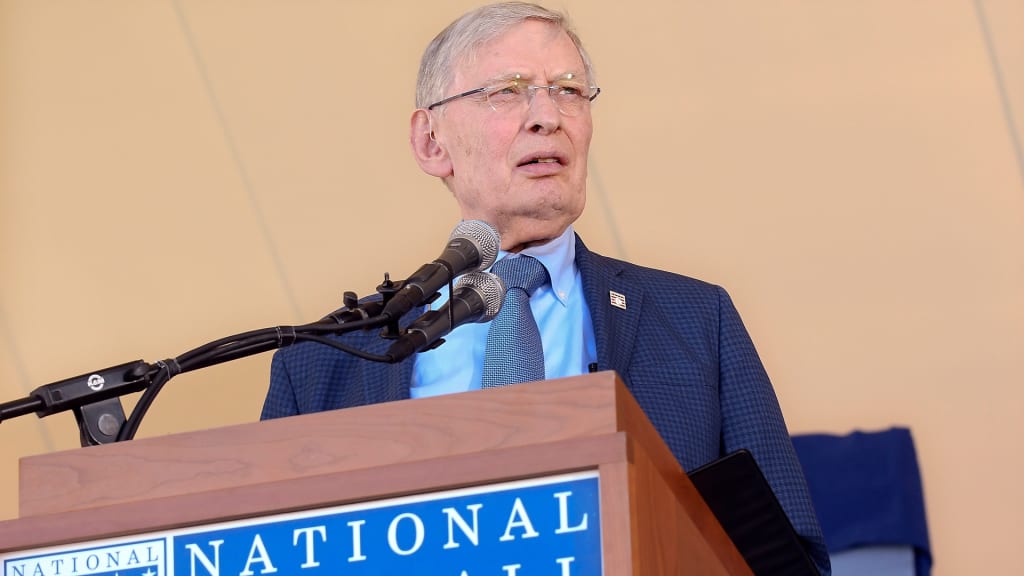
Bud Selig first began to think seriously about writing a book during a visit to the Baseball Hall of Fame in 2009. Historian Doris Kearns Goodwin planted the seed as she listened to a conversation between then-Commissioner Selig and Hall of Famer Hank Aaron.
“We started telling stories,” Selig remembers, “and you know how those things go.”
Memories poured forth of players and managers, of games, arguments, jokes and all the rest.
“Doris finally says, ‘Commissioner, you’ve got to write a book. You can’t let all this go when you go,’” Selig says.
He began work shortly after retiring as Major League Baseball’s ninth Commissioner in January 2015, working in spurts around his three college teaching gigs and various speaking engagements.
His book, "For The Good Of The Game," written with veteran baseball writer Phil Rogers, is being released by Harper Collins on Tuesday. He did just what Goodwin suggested he do; that is, spinning yarns of Robin Yount and Bob Uecker, of George Steinbrenner and Barry Bonds, and dozens of others.
He attempts to put his 23 years as baseball’s Commissioner into context and to detail a tenure in which he led an effort to reshape baseball in all sorts of ways.
His proudest achievement will always be bringing Major League Baseball back to his hometown of Milwaukee as owner of the Brewers, and helping to get Miller Park built. But as Commissioner, he led an effort that resulted in 24 years of labor peace, soaring economic growth and a host of on-the-field changes, including an expanded postseason.
“What we were able to do gives me a lot of pride,” Selig says. “I know how tough it was. I know what we went through in 1994. We lost a World Series that year.”
And though the future of the game seemed uncertain when the strike finally ended in the spring of 1995, MLB recovered, and has continued to grow. As a result, Selig was inducted into the Hall of Fame in 2017.
“That honor means more to me than words can articulate,” he says. "I’d gone there for years while I was Commissioner, and before. I love the place like a lot of baseball fans do. But that Sunday morning when I’m about to be inducted, I remember waking up thinking to myself, ‘Oh my God, the Hall of Fame.’
“To think that this kid who’d been walking the streets of Milwaukee in the ‘60s fighting to get a team would end up as a Hall of Fame Commissioner, I mean, you couldn’t have dreamed it.”
In the 4 1/2 years since leaving the Commissioner’s job, Selig, 84, has remained connected to the game in various ways. First, there’s his new title: “Commissioner Emeritus.”
“One thing I was careful about is allowing Rob [Manfred, his longtime friend and now baseball’s 10th Commissioner] to implement his own vision,” Selig says. “He knows he has my support. He knows that if he needs my advice, I’ll give it.
“But Rob is his own man, and his vision of our sport is his vision. He’s doing a fabulous job, as all of us in the game knew he would.”
Selig teaches "Baseball in American Society, 1945-Present" at his alma mater, the University of Wisconsin-Madison, and at Arizona State University. He also teaches sports law at Marquette University.
“Basically, I’m practicing law without a license,” Selig jokes.
His "Baseball in American Society" class begins with a discussion of Jackie Robinson. While Commissioner, Selig made the decision to retire Robinson’s uniform No. 42 throughout baseball in 1997.
“You know he’s one of my favorite topics,” Selig says. “He’s not just one of the most important people in baseball history. He’s one of the most important people in American history. But his walking onto that field for the Dodgers in 1947 and breaking the color line was baseball’s finest hour.”
Selig’s class also deals with baseball’s labor wars, expansion, steroid era and a host of other topics.
“I love teaching,” he says. “My mother was a teacher and always thought I’d teach. I’ve come full circle. I get more from these students that they get from me, and after each semester, I get letters that bring tears to my eyes.
“It’s an interesting class to teach. I’m a history professor on something I participated in. This isn’t my teaching on Alexander Hamilton or Franklin Roosevelt, who was my political hero. I’ve enjoyed it immensely.”
Selig still watches baseball, lots of it, tuning in when the first games begin on the East Coast and staying awake as long as he can for the West Coast games. Oh, and he’s back to rooting unabashedly for his hometown Brewers.
As White Sox owner Jerry Reinsdorf said when Selig left office, “Now you can return to your true love -- the Brewers.”
Indeed, that is the case. And just as he did during his years as Brewers owner, he cannot stay still when the Brew Crew is on the field. Last fall, when the Brewers were in the playoffs, he was so nervous during games that he had to step outside his box and listen to crowd reaction from a hallway, relying on his wife, Sue, to tell him what he had missed.
“I can’t help myself in that way,” he admits.
Phillies executives Bill Giles and the late Dave Montgomery once joked that owners aren’t supposed to be as popular as Selig is among Brewers fans. Selig felt that himself when he was asked to throw out a ceremonial first pitch last fall before Game 6 of the National League Championship Series.
In that moment, Brewers fans were able to show him their appreciation, not just for getting a team, not just for getting a ballpark built, but for representing their city in a way that made them proud.
“When I walked onto the field, what a response, what an ovation, oh my God,” he says. “I almost cried. I’ve often thought about what the Brewers mean to this city. Paul Molitor and Robin Yount. Cecil Cooper and Rollie Fingers. Henry Aaron. Now Christian Yelich and Lorenzo Cain, and my guy, Craig Counsell, a Milwaukee kid, as our manager.
What if I hadn’t succeeded in getting a team? Do I think about that? You bet I do. My life has been a dream come true in so many ways.”
